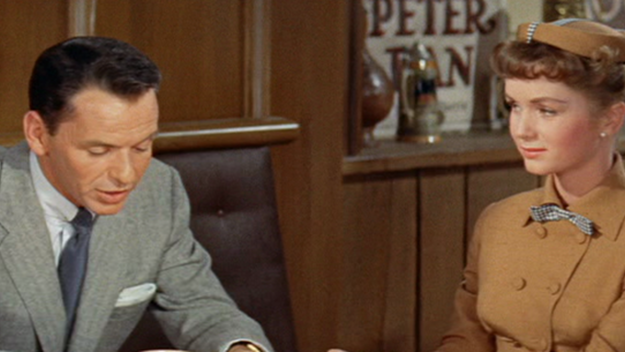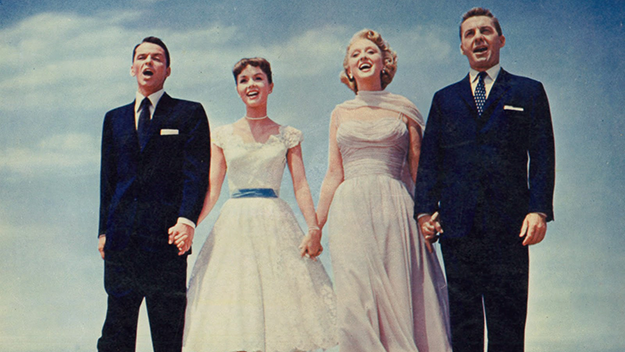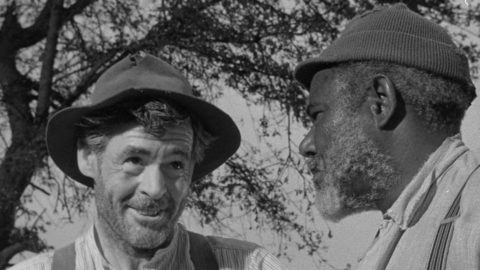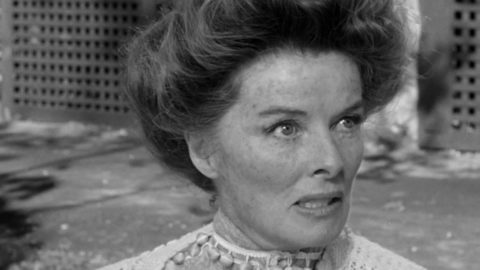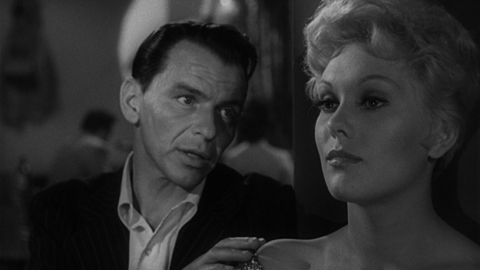TCM Diary: The Tender Trap (1955)
FILM COMMENT and Turner Classic Movies are pleased to announce a new editorial collaboration: “Film Comment Picks.” Each month, the team at FILM COMMENT will publish new essays inspired by films, directors, or actors featured in TCM’s programming.
“You see a pair of laughing eyes, and suddenly you’re sighing sighs. You’re thinking nothing’s wrong, you string along, boy, then snap! Those eyes, those sighs, they’re part of the tender trap.”
To Sinatra devotees the world over, the Sammy Cahn lyrics crooned by a typically insouciant Ol’ Blue Eyes, fedora cocked as he saunters hands-in-pockets through an azure Cinemascope sky, are so familiar that they signal nothing more than carefree, love-struck bliss. But hearing them form the preamble to Charles Walters’s 1955 battle-of-the-sexes comedy, they take on the tenor of a warning: “trap” becomes the operative word. And more than just a frothy romp, the film proves as revealing a time capsule of mid-century attitudes toward sex, marriage, and responsibility as any novel by John Cheever or Richard Yates.
Adapted by Jules Epstein (Casablanca) from Max Shulman and Robert Paul Smith’s Broadway play, The Tender Trap stars Sinatra as Charlie Reader, a paragon of Eisenhower-era machismo —and never let it be said that Sinatra was no Method actor. Charlie is a theatrical agent who somehow can put across a song better than any of his clients, leading viewers to wonder why he settles for 10 percent. But he claims 100 percent of the eligible females in Manhattan, who tear through his apartment like a tag team, walking his dog, bringing him whitefish and cheese when not reclining on his sofa, being told they’re “not flabby or anything like that; just nice and soft.” (Far from an ad-lib, this compliment recurs often enough to suggest it’s a fixture in Charlie’s repertoire.) But all glory is fleeting, as the Romans said in somewhat loftier language, and so a series of incidents must conspire to challenge the permanence of Charlie’s bachelorhood.
The first is the unexpected arrival of Charlie’s oldest friend Joe McCall (David Wayne) from the Midwest, on amicable hiatus from his two wives, Ethel and the Indiana Pharmaceutical Company. Joe embodies all the earthly bonds Charlie praises publicly but eschews passionately, and hearing Joe talk of wall-to-wall carpeting and kids in need of braces, Charlie can’t tie his tie fast enough, leaving his flabbergasted friend behind to take his messages (“Your entire harem called”). So far, the set-up resembles Marc Camoletti’s penthouse farce Boeing-Boeing (filmed in 1965 with Jerry Lewis)—though happily, few doors are slammed here and Charlie finds himself engaged to only two girls at once, not three.
Of the aforementioned harem (which includes future stars Carolyn Jones and Lola Albright), the most realized member is Sylvia (Celeste Holm), a droll 33-year-old studio musician who not-so-secretly pines for marriage with Charlie. She and Joe become his wisecracking two-headed conscience—and his need for them skyrockets when he meets Julie Gillis (Debbie Reynolds), a 22-year-old actress whose softness he’d like to extol. Julie has other plans, however—she wants to marry by the 12th of next March (her parents’ anniversary), have a child, move to Scarsdale, and raise two more children. High schools and colleges are pre-selected. Julie, played by Reynolds at her most indefatigable, denotes an intriguing paradox: the type-A domestic, determined to subjugate herself no matter who she tramples in the process. “A woman isn’t really a woman until she marries and has children, don’t you agree?” she asks the trio. Sylvia and an obliging Charlie concur; Joe, the sole possessor of a wedding band, suggests that fulfillment isn’t assured when it’s dependent on another party staying fulfilled. Julie isn’t buying; her commitment is manifest in the circled March 12 block on her calendar.
For those watching The Tender Trap as social anthropologists, the dramatis personae represent four distinct values on the matrimonial spectrum. And they represent little else—the film would have us believe New Yorkers in 1955 thought of nothing but marriage. That Charlie and Joe want different things from their relationships has been clear since their junior prom (Joe walked away with Ethel; Charlie, a paternity suit). Julie is so resolutely a homebody that as Charlie readies himself for their first date, she proudly proclaims her intent to read his mail. Sylvia forlornly enumerates the options available to unwed women of a certain age: “married men, drunks, pretty boys looking for someone to support them, lunatics looking for their fifth divorce… Quite a list.” For all her worldly airs, Sylvia, when faced with the question, can think of nothing worse than never getting married. With her matchless sardonic delivery and painfully retractable expectations, Holm both ballasts and steals the film, whose preceding silliness is thrown in sharp relief by her shattering exit speech about men’s desire for girls, which can only be satisfied by not marrying them because building a life together often requires wall-to-wall carpeting.
If Sylvia supplies the realism, Joe delivers the decency. Wayne, in a surpassingly sensitive performance, draws the heartiest laughs in his gobsmacked responses to Sinatra’s playboy lifestyle. The most ambivalent figure on screen, Joe describes Julie as “a trap with the trigger loaded” and depicts his own home life in like terms, but he also sees the unsoundness, and profound selfishness, of Charlie’s routine. By the end of his arc he has restored his belief in middle-class values, branded Charlie “truly indecent”—and vowed to visit him again in 11 years, when the itch returns.
Julie is the rare ingénue who is cast in a major role in a Broadway show with no prior experience, allowed to decline the mandatory run-of-the-play contract because she plans to get married, and skips rehearsal to look at a living room set (“blind obedience works best,” a salesman tells Charlie when she asks him to model it). Charlie’s willingness to break his rules for her surprises everyone, most of all himself—but to the film’s credit, it’s ascribed to the lure of youth and the thrill of the hunt (members of both genders remark censoriously on their age difference). The ending of the film is no shocker—the quartet reprising the title song as the harem, all clad in black, sing backup. But the film’s variegated take on the happily-ever-after of wedlock leaves it unclear whether Good Time Charlie’s good times will continue and Julie’s domestic dreams will bring her contentment, or if they’re hooked, and cooked, and caught in the tender trap.
The Tender Trap airs June 5 on Turner Classic Movies.
Steven Mears is a regular contributor to FILM COMMENT and received his MA in film from Columbia University.




